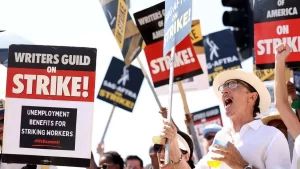
Screenwriters in the US say they have reached a tentative deal with studio bosses that could see them end a strike that has lasted nearly five months.
The Writers Guild of America (WGA) said it was “exceptional – with meaningful gains and protections for writers”. WGA members must still have a final say.
Hollywood writers are striking in a row over pay and the use of artificial intelligence (AI) in the industry.
Stranger Things and the Last of Us are among the shows which have been paused.
It is the longest strike to affect Hollywood in decades and has halted most film and TV production.
A separate dispute involves actors, who are also on strike.
The writers’ walkout, which began on 2 May, has cost the US economy around $5bn (£4.08bn), according to an estimate from Milken Institute economist Kevin Klowden.
The dispute has shut down many of America’s top shows, including Billions, The Handmaid’s Tale, Hacks, Severance, Yellowjackets, The Last of Us, Stranger Things, Abbott Elementary and several daytime and late-night talk shows.
As well as issues around pay, the writers fear the impact of artificial intelligence potentially supplanting their talents.
Negotiations also broke down over staffing levels and the royalty payments that writers receive for popular streaming shows. They complain that those residuals are just a fraction of the earnings they would get from a broadcast TV show.
Traditionally, writers would receive additional payments when their programmes were repeated on a broadcast network. However, this model was undermined with the advent of streaming.
As a result part of the payments writers now receive generally include a certain amount of money which is intended to compensate for the royalties they are not receiving from broadcast repeats.
The WGA leadership and union members need to agree a three-year contract with the Alliance of Motion Picture and Television Producers (AMPTP) before they return to work.
The guild’s message on the proposed deal said details still had to be finalised, and it was not yet calling off the strike, but “we are, as of today, suspending WGA picketing”.
Hollywood trade publication Variety reported that staff on late-night talk shows could return to work as soon as Tuesday following the announcement, adding broadcasts could resume as soon as October.
But in its message to members, the union’s negotiating committee asked for patience on details of the pact.
“What remains now is for our staff to make sure everything we have agreed to is codified in final contract language,” the union said.
“And though we are eager to share the details of what has been achieved with you, we cannot do that until the last ‘i’ is dotted.”
Commenting on the news, Alistair Dent, Chief Commercial Officer at data company Profusion, said: “The deal to end the WGA strike is an interesting first glimpse into how professionals in different sectors could react to generative AI. The first thing to note is that the writers were able to act pre-emptively to protect their careers. This is because the use case for gen AI in the creative industries – like writing and image generation – is very clear. It’s much easier to secure safeguards against a technology before it has gained widespread adoption. For other professionals this may be more difficult because we simply can’t be certain how quickly AI will develop and its capacity to automate other jobs. Some may find that AI automation happens incrementally and their chosen career slowly becomes obsolete preventing a single moment to push back.
“The second thing to note is the WGA’s power to push back. Few professions in the UK and US have this type of organisational power and ability to shutter an entire industry. AI automation is likely to impact lower skilled and routine jobs first and those who undertake these activities are often the least empowered. Unions will need to play a very important role in monitoring the situation and protecting workers – we may see generative AI reinvigorating unions. The sad reality is that, unchecked, generative AI could spark a race to the bottom where businesses are incentivised to apply to more and more scenarios – regardless of the ethical implications.
“With any type of revolutionary tech there will be winners and losers. The sensible approach is to ensure that those who are likely to lose out – in this case by seeing their jobs becoming obsolete – are treated ethically. This means that businesses adopting upskilling programs that will help them adapt their career to AI. AI should create plenty of career opportunities and, if applied correctly, should support people to do their jobs better not replace them entirely.
“History has shown us that it is futile to try and hold back innovation that has such clear benefits. However, it has also taught us that any major advancement needs to be managed carefully. It should not be up to workers to strike against the misuse of AI, rather, we all need to be thoughtful about how we want AI to develop. This means bringing together businesses, governments and workers to create an ethical framework to prevent against misuse of AI and guide its development.”
Read more:
Hollywood writers in deal to end US studio strike





